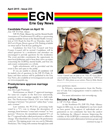Mindfulness: How to Rewire Your Brain
Mindfulness is in the news lately: celebrities tout it, Oprah loves it. But, what exactly is it? And is it worth your time? Let's check it out:
Recent studies in neuroplasticity (our brain's ability to adapt and rewire itself) indicate that mindfulness is a powerful tool you can use to literally rewire your neural pathways. This isn't about spirituality and Buddhist meditation; we're talking science here!
Need more proof that mindfulness is practical, applied science? Silicon Valley has become a hotbed of mindfulness conference and classes. Google has an in-house mindfulness program called :Search Inside Yourself." Even General Mills – that bastion of conservatism - has trained over 500 employees in mindfulness classes.
To be mindful is to be free of other people's advice, biases and opinions. Mindfulness isn't all about rainbows and happy stuff: we can be mindful of sorrow, pain and anger. Being mindful doesn't mean that we become like a big blob of :it's all good". It's about sharpening your sense of how things really are and not ignoring or distorting reality.
For example, what do you do when something painful happens? Let's say, you are rejected by a potential date/employer for a date/job you really wanted. A typical response could be:
I really wanted that.
I feel so disappointed and angry.
I don't like these feelings.
Maybe I should call my friends and go out for a few drinks so I'll feel better.
I don't want to feel these feelings of rejection.
It hurts.
Mindfulness encourages us not to numb out, with alcohol, drugs, food or any other avoidance technique. Instead, we can be mindful and see what happens. In that case, your conversation with yourself might go more like this:
I really wanted that.
I feel so disappointed and angry.
Okay, let me just feel these feelings. I know it won't kill me.
I can sit quietly, take a few breaths and just notice how I feel.
Actually, it's not so bad. In fact, I don't need to run from these feelings.
I know they will pass. They're here now and I'm okay with them.
It's quite a different way of handling something, isn't it?
Mindfulness is the enemy of living in the past or the future.If you're living in the past, you're either missing something that happened or regretting something that happened. Either way, you're checked out. Not present.
If you're living in the future, you're probably bored in the present. You may even tell yourself that your life right now isn't exciting enough, and you should be doing something about it.
But the truth is, you probably won't be happier, even if you get it. If you can't be happy now, it's highly unlikely that some future event is going to change that for you.
Does that piss you off to hear this? The only happiness is in the present moment and, if you're not aware/mindful of this moment, you'll miss it. In fact, the more you numb out, the more you're missing your life.
Mindfulness encourages you to enjoy EVERY moment as much as possible. Even pain has lessons, and when we're willing to feel the pain in the present moment and learn from it, the pain passes more quickly.
Psychologist Jon Kabat-Zinn uses mindfulness to help people with chronic physical pain. His program at the University of Massachusetts Medical Center has become so successful that hospitals world-wide have embraced the use of mindfulness to work with physical and emotional pain.
I really like Kabat-Zinn's work (I've read his books and listened to his CDs) so here is my suggestion on how to be more mindful:
- Sit comfortably, try to keep your back relatively straight.
- Close your eyes and pay attention to your breath. Focus on it going in and out of your body.
- As thoughts come into your mind, just notice them - :Hello thoughts"- and return to your breathing. Let the thoughts be like clouds passing by.
- When your mind wanders – and it will -gently bring it back to your breathing.
- Start out doing this for a minute at a time, and slowly add a minute each day.
Give it a try and see how you feel. Don't be surprised when you start to feel calmer, more confident and more present.




